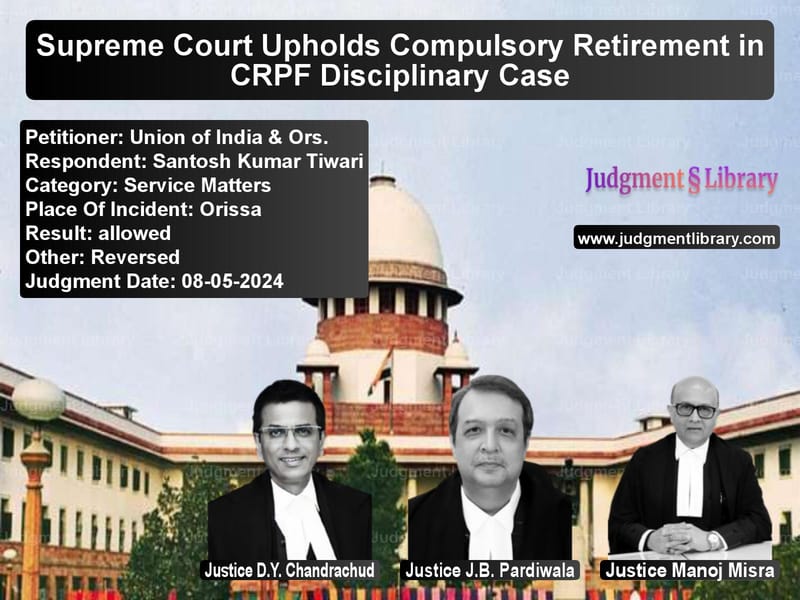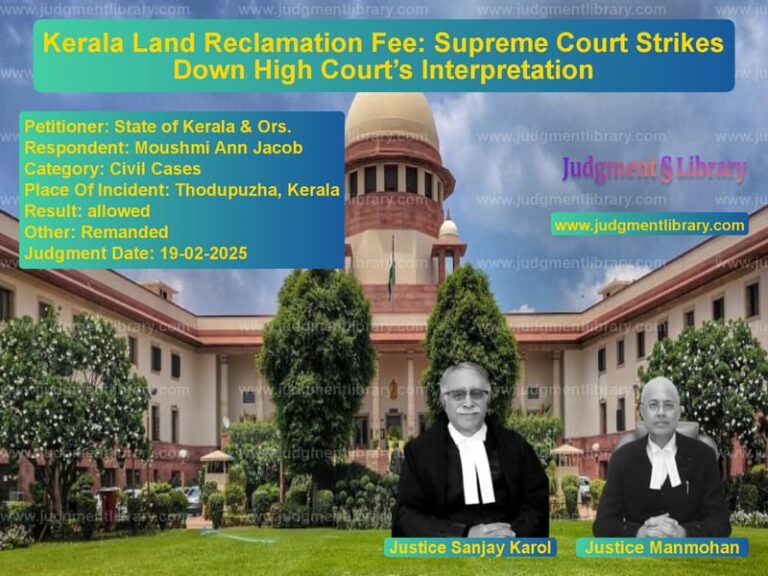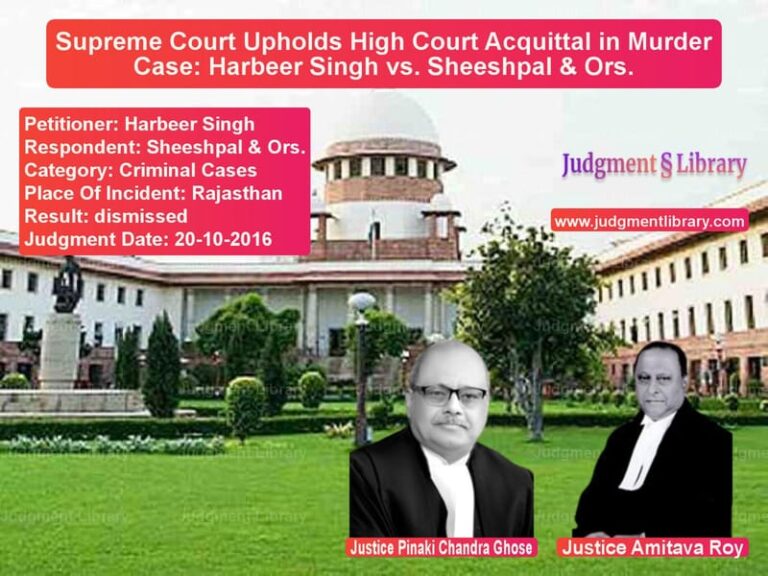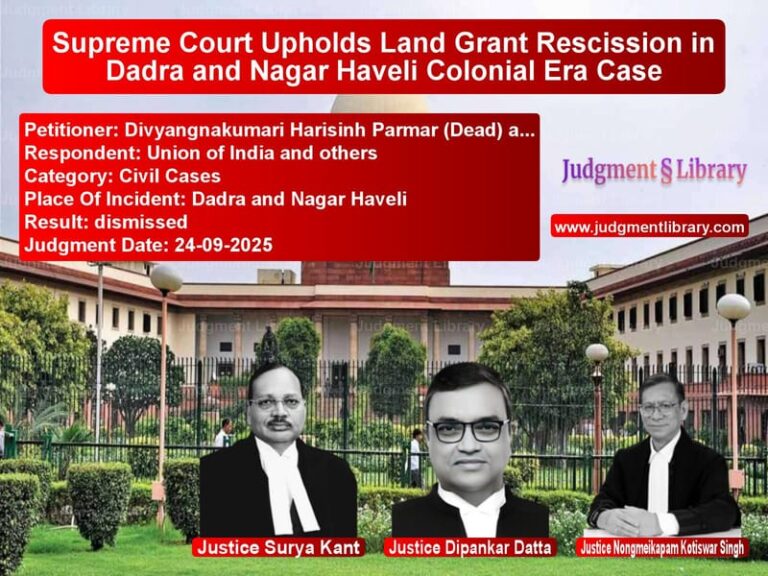Supreme Court Upholds Compulsory Retirement in CRPF Disciplinary Case
The Supreme Court of India, in the case of Union of India & Ors. vs. Santosh Kumar Tiwari, has upheld the punishment of compulsory retirement imposed on a CRPF Head Constable found guilty of assaulting a colleague. The ruling reinforces the authority of disciplinary bodies within paramilitary forces and clarifies the application of disciplinary regulations under the Central Reserve Police Force Act, 1949 and the CRPF Rules, 1955.
Background of the Case
The respondent, Santosh Kumar Tiwari, served as a Head Constable in the Central Reserve Police Force (CRPF). He was charge-sheeted for allegedly assaulting and abusing a fellow colleague. Following a departmental inquiry, the charges were found to be proven, leading to his compulsory retirement on 16.02.2006. His appeal was dismissed by the Deputy Inspector General (P), CRPF, on 28.07.2006.
Legal Proceedings
- 2006: Tiwari filed a writ petition before the Orissa High Court, challenging his compulsory retirement.
- 2020: A Single Judge Bench ruled in his favor, holding that compulsory retirement was not a recognized punishment under Section 11(1) of the CRPF Act. The court remanded the matter to the disciplinary authority to reconsider the punishment.
- 2020: The Union of India appealed against this ruling before a Division Bench, which upheld the Single Judge’s order.
- 2024: The Supreme Court, reversing the High Court’s decision, ruled that compulsory retirement is a valid punishment under Rule 27 of the CRPF Rules.
Key Legal Issues
The Supreme Court considered the following legal questions:
- Is compulsory retirement a permissible punishment under the CRPF Act and Rules?
- Does Rule 27 of the CRPF Rules, 1955 override the limitations under Section 11(1) of the CRPF Act?
- Was the punishment proportionate to the misconduct?
Arguments by the Appellant (Union of India)
The Union of India, represented by Additional Solicitor General Aishwarya Bhati, argued:
- Compulsory retirement is a valid disciplinary measure: Rule 27 of the CRPF Rules explicitly lists compulsory retirement as an available punishment.
- Legal basis under the CRPF Act: Section 11 allows punishments to be imposed “subject to any rules made under this Act.” Since the CRPF Rules are made under the Act, they are legally valid.
- Proportionality of punishment: The misconduct—assaulting a colleague—warranted a severe penalty given the disciplined nature of the force.
Arguments by the Respondent (Santosh Kumar Tiwari)
The respondent, represented by Advocate Anand Shankar, contended:
- Ultra vires Rule 27: Compulsory retirement is not included in Section 11(1) of the CRPF Act, making its introduction in Rule 27 unlawful.
- Procedural irregularities: The inquiry process was flawed, and the evidence was insufficient to prove the charge beyond doubt.
- Disproportionate punishment: The alleged assault did not warrant a penalty as severe as compulsory retirement.
Supreme Court’s Judgment
The Supreme Court ruled in favor of the Union of India, setting aside the Orissa High Court’s judgment. The key observations were:
“Section 11 of the CRPF Act does not exhaustively define the punishments available. The phrase ‘subject to any rules made under this Act’ allows the Central Government to specify additional penalties through rules. Rule 27 validly provides for compulsory retirement.”
- The punishment was held to be legally sound under the combined reading of the CRPF Act and Rules.
- The respondent had committed a serious act of misconduct by assaulting a fellow officer, justifying the penalty.
- The Court emphasized the need for discipline in armed forces and paramilitary organizations.
Impact of the Judgment
This ruling has significant implications for disciplinary proceedings in armed and paramilitary forces:
- Affirms the authority of CRPF disciplinary rules: Rule 27 is confirmed as a valid source of punishments, allowing compulsory retirement as a disciplinary action.
- Clarifies the interpretation of Section 11(1): The ruling establishes that the section does not limit the punishments that may be prescribed by rules.
- Strengthens military discipline: The decision underscores the importance of strict disciplinary standards in paramilitary forces.
Conclusion
The Supreme Court’s decision in Union of India & Ors. vs. Santosh Kumar Tiwari upholds the disciplinary framework within the CRPF, affirming that compulsory retirement is a legally valid punishment under Rule 27 of the CRPF Rules. The ruling reinforces the need for maintaining discipline in paramilitary forces while ensuring that punishments remain within the scope of the law.
Petitioner Name: Union of India & Ors..Respondent Name: Santosh Kumar Tiwari.Judgment By: Justice D.Y. Chandrachud, Justice J.B. Pardiwala, Justice Manoj Misra.Place Of Incident: Orissa.Judgment Date: 08-05-2024.
Don’t miss out on the full details! Download the complete judgment in PDF format below and gain valuable insights instantly!
Download Judgment: union-of-india-&-ors-vs-santosh-kumar-tiwari-supreme-court-of-india-judgment-dated-08-05-2024.pdf
Directly Download Judgment: Directly download this Judgment
See all petitions in Disciplinary Proceedings
See all petitions in Judgment by Dhananjaya Y Chandrachud
See all petitions in Judgment by J.B. Pardiwala
See all petitions in Judgment by Manoj Misra
See all petitions in allowed
See all petitions in Reversed
See all petitions in supreme court of India judgments May 2024
See all petitions in 2024 judgments
See all posts in Service Matters Category
See all allowed petitions in Service Matters Category
See all Dismissed petitions in Service Matters Category
See all partially allowed petitions in Service Matters Category







